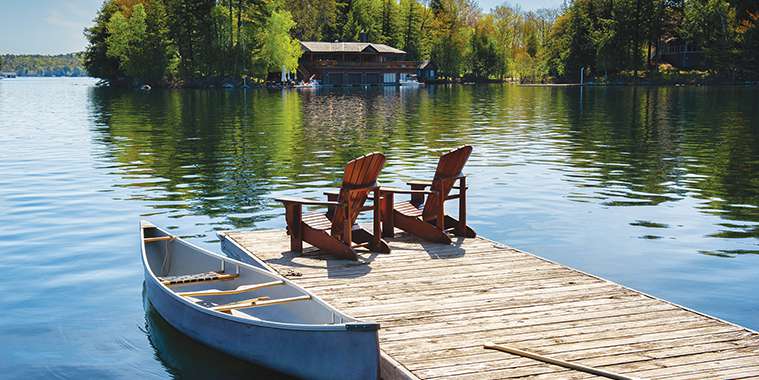With the first official long weekend of “summer” upon us, here’s a really good question to ask yourself: How do you like to spend all your weekends during the summer?
If your answer is cottage hopping between your friends’ and family’s lakeside properties, you might be asking yourself, “how can I get one of my own?” or “what should I be looking for?” If you decide to take the plunge, here are seven things you should know about buying a lakeside cottage.
1. Do you have the budget to buy a property directly on a lake?
On some lakes, you can shell out at least 40% more for a house with private water access. If that’s not an option, are you willing to consider shared access? Are you fine with walking to the beach, or taking a short bicycle ride or drive to a nearby public beach?
2. Do you want to use a motorboat or do you prefer an eco-friendly lake?
If part of your cottage plan includes wakeboarding or water skiing, you’ll want to make sure you’re looking at lakes that permit motorized boating. Is the lake deep enough to accommodate a motorboat or the activities you have in mind? Do you have access to a private or public launch? Is it safe for swimming?
3. Are you an early bird or a night owl?
If you are more of a night owl, you will want to enjoy sunsets on your newly-acquired piece of heaven. The location of the cottage or house will be very important depending on whether you want a picturesque sunset or an energizing sunrise.
4. Are you buying a year-round property or a three-season weekend getaway?
If you are looking for a weekend getaway, you will want to avoid travelling too far from your main residence. Are you aiming for a 60-minute or less commute? This will narrow down the bodies of water available to you. If you’re willing to drive a bit longer, you have many more options to choose from.
If you decide to make a more permanent move, be sure to think about services like sewage, snow removal and Internet access, as well as neighbourhood amenities like grocery stores, banks and pharmacies.
5. Is the cottage bordering a protected area?
Do you know whether the property includes or borders wetland areas, a riparian buffer strip or even protected wildlife breeding grounds? Most waterfront areas have regulations that prohibit cutting trees or vegetation, demolishing and rebuilding or even installing septic tanks due to lack of adequate space from the waterfront or protected area(s). You will need to put your research skills to the test to confirm the bylaws, which may also include consultation with local conservation authorities.
Where a septic tank is not possible, you may be able to use a holding tank, which is designed to hold all wastewater to prevent seepage into the environment. For many people this is an adjustment, as water usage can quickly sneak up on them (think water used for toilets, sinks, showers, dishwasher and washing machine) and you’ll have to hire a licensed contractor to empty it. Some areas even require the installation of a tertiary septic system, or personal water filtration plant, where the treated water is then discharged into a retention ditch or stream.
Pro tip: A local REALTOR® can help you navigate the murky waters of what is allowed and what is not, especially if you’re planning to build or renovate.
6. Are you comfortable having neighbours or do you want some degree of isolation?
Waterfront properties are highly sought after. So, if you’re looking for complete peace and quiet, a more suitable choice might be a woodland or countryside house or cottage near a pond, or with deeded or public water access.
7. Are there attractions for you to enjoy all year round?
While your waterfront property may provide all the activity you need when the weather is nice, are there other attractions to keep you busy in the off season? Being near ski slopes, snowshoeing, ice fishing, hiking – or even restaurants – may help give you more bang for your buck. If you’re planning on renting out your cottage for part of the season, consider what area attractions and amenities are nearby that will make your cottage more appealing.
8. Do you have a local REALTOR® who can help you find your dream waterfront property within your budget?
Always work with a local REALTOR® — they’re best equipped to know the area, the bylaws and, most importantly, the properties for sale that might be of interest to you. It would be a shame to miss out on your perfect waterfront retreat just because you don’t know what to look for!
— Realtor.ca



